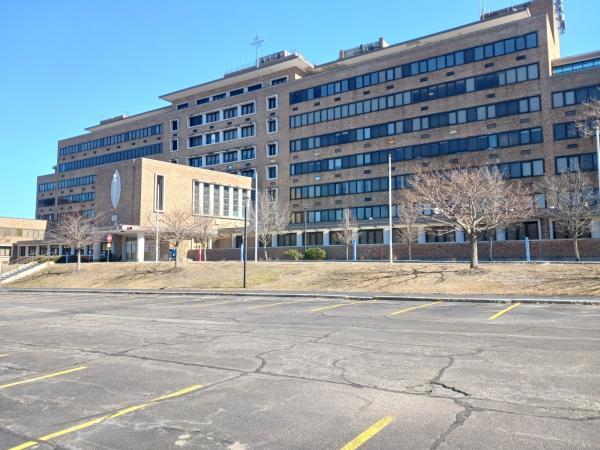April 9, 2025

Above, a closed Carney Hospital as seen on March 3, 2025. Seth Daniel photo
The state’s Health and Human Services Secretary, Kate Walsh, had some interesting things to say about the future of hospitals— and specifically the now-shuttered Carney Hospital in Dorchester— this week during a public hearing held in Attleboro that was covered by State House News Service.
According to the service’s report, Walsh offered some of her most expansive comments about the aftermath of the Steward Health Care debacle that she was a central figure in last year.
The Carney closed its doors on Aug. 31 as part of a bankruptcy case that was facilitated in part by Gov. Healey’s administration, which managed to keep six Steward hospitals open through the crisis. Carney and a second hospital in Ayer – Nashoba Valley— were shuttered while Walsh and Healey “arranged for a state aid package totaling at least $417 million over three years to help the new operators, and the state convened local task forces to address health care desserts in the areas Steward fled,” the SHNS reporter recalled.
The working group focused on Ayer issued their report last month. The Carney working group— which was assembled jointly by Healey and Mayor Wu— has not yet issued its findings, which were originally supposed to be made public by early March. This week, there’s still no draft report about the Carney ready for public consumption, according to sources within City Hall.
That’s what makes Kate Walsh’s specific comments about Carney notable.
According to SHNS, Walsh told lawmakers that “what I think we need to do here in Massachusetts is a little bit of what’s happened as a result of the closures at Carney and Nashoba.
“I think at Carney we’ll see a combination of health care delivery, a school, and housing,” she said. “That’s great for that neighborhood. I think that we just have to think differently about what success looks like and I say that acknowledging that it’s very hard for communities to give up their hospitals.”
In referencing a potential school sited on the former Carney site, Walsh may be citing a proposal by a consortium of interests, including Carney’s current landowner, Apollo, to build a state-of-the-art facility to house the Edward M. Kennedy Health Career Academy. That idea was one of five submitted in response to a city of Boston request for development ideas for the school, which is currently housed on two campuses in Mission Hill and Roxbury.
But, as The Reporter first reported weeks ago, the request for proposals response from the Apollo-backed group is just that— a proposal. It’s hardly a done deal or, from sources we’ve talked to, even a likely selection from a city administration keen to re-purpose an existing building, not build an expensive new facility from scratch.
Walsh’s comments are also curious in the context of the now-much-delayed working group report, which is expected to make recommendations to both Healey and Wu about likely next steps for the Carney site.
Wouldn’t it be best to first give the public and policy makers an opportunity to review the 33-member board’s findings— made over four-plus months of meetings and community engagement—before hypothesizing about likely re-uses?
City Councillor John FitzGerald, who sits on the Carney working group and represents the area around Carney, had this to say: "The Working Group had a robust series of meetings where the best in healthcare and community put their heads together to really imagine using that site as a means to address a growing healthcare access issue.
"While we know that healthcare is the priority for the site, other uses can complement that. I look forward to the recommendations coming out soon and seeing what uses fall within those recommendations, but I don’t want to be presumptuous in what can and cannot go there at this moment," said the District 3 councilman.
Kate Walsh might think that a mix of school, housing, and health care delivery is “great for the neighborhood.” She’s entitled to her opinion, although we frankly are far more interested in hearing the thoughts of the men and women who’ve been charged with scrutinizing the site for the last several months.
Bill Forry is the executive editor and co-publisher of The Reporter.


